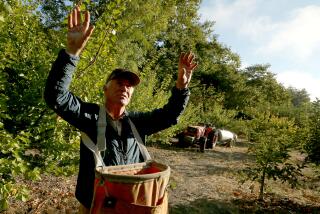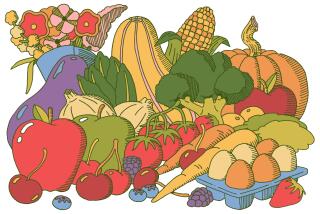Sid Weiser, founder of L.A. chef favorite Weiser Family Farms, dies at 95
- Share via
Sid Weiser had a rough start as a farmer, growing apples in Tehachapi, Calif., in the late 1970s. He was 55 years old, recently retired from teaching and facing consecutive years of spring frost.
Weiser and his son Alex decided to focus on new and experimental varieties of potatoes, melons and other vegetables. Over the next 40 years, they turned the Weiser Family Farms into one of the best-known and sought-after produce purveyors in California.
The Weiser Family Farms name appears on menus at the most lauded restaurants in Los Angeles, influencing dishes at Providence, Mélisse, Birdie G’s and Orsa & Winston. Its potatoes, melons and mulberries have been a favorite of Southern California chefs and home cooks for decades. And customers line up every week to peruse the booths at farmers markets for purple potatoes, multicolored carrots and romanesco — varieties of produce the family helped popularize before they were mainstream.
“Sid was one of the first to search for special and unique ingredients that were not available,” said Josiah Citrin, chef-owner of Mélisse and Citrin restaurants. “He was dedicated to producing everything the right way, which showed in the quality and flavor of the ingredients. Sid’s dedication to farming was a huge support in Mélisse’s success.”
Weiser died Monday after a brief battle with liver cancer. He was 95, two days shy of his birthday.
Weiser was born in Boyle Heights on Sept. 30, 1924. He was drafted to the Army and fought in the Battle of the Bulge during World War II, earning two Purple Hearts as a medic. After returning from the war, he graduated premed from USC.
Instead of helping with his father’s cleaning business after graduation, he traveled to Mexico City and ended up staying five years, making jewelry. He met his future wife, Raquel, at a dance there, and they married and moved back to Los Angeles to start a family.
Weiser taught chemistry and was a high school gang counselor at Garfield High School in East Los Angeles. He was part of the same teaching staff as Jaime Escalante and was involved in school activities including camping trips and the chess club.
“He basically lived this suburban life teaching, but he always dreamed of being a farmer,” said Alex.
Weiser retired from his teaching job in 1976, thinking then was as good a time as any for a career change. He and his wife, Raquel, purchased a 160-acre apple orchard in Tehachapi and started Weiser Family Farms in 1977. They grew red delicious and golden delicious apples, selling mostly to Hansen’s and other large juice companies.
“I bought it because I didn’t know anything about farming, I just wanted to do it,” Weiser told The Times in 2005. “After about five years, we nearly went bankrupt.”
Following three consecutive spring frosts, business was far from booming.
“The first five years were really scary,” Alex said. “We were losing money rapidly.”
In 1981, over coffee with a friend, Weiser ended up trading his condo in Rosemead, Calif., for another 83-acre farm in Tehachapi. He started doing big bus tours, shuffling senior citizens through the farm, offering them a meal and the opportunity to pick fruit and buy produce straight from the farm.
His dad was a true entrepreneur, but Alex credits a 1977 executive order from Gov. Jerry Brown with saving the business. The order enabled farmers to sell directly to customers at farmers markets. Before then, farmers were required to package and label products before selling anywhere off the farm site.
In 1981, Vance Corum, who helped start the direct farmers market program for the state of California, knocked on the family’s door.
“I’ll never forget it,” Alex said. “He told us about these farmers markets that had started in Pacoima and Gardena, and said that we should think about doing that.”
The opportunity came at a perfect time, as the family had grown tired of growing produce for juice brokers, who Alex said didn’t respect the fruit.
“At the farmers markets, people wanted flavor. It helped us survive,” he said.
In addition to generating a new cash flow, the farmers markets allowed the Weisers to experiment with the types of produce they were growing. After their experience with apples and the frosts, they started planting potatoes (a much more reliable and durable crop), mulberries and other vegetables to diversify their offerings. Eventually, they used the direct interactions with customers to help dictate their next crops.
Weiser sent Alex and some of his son’s friends to sell produce at farmers markets around Southern California. At one time, Alex estimates they were selling at 40 farmers markets.
“Then the chefs came [to farmers markets] in the mid-’90s, like Nancy Silverton and Mark Peel,” Alex said. He remembers his dad growing fingerling potatoes and Persian mulberries for Silverton. “What made us shine was going to the markets and talking to Nancy [Pizzeria Mozza] and Suzanne Goin [A.O.C.] and Jeremy Fox [Birdie G’s] and getting the opinions of the best palates in the city.”
With twice the sugar of raspberries, delicate Persian mulberries are a sweet treat
“Weiser Farms was the first farm that I was introduced to when I moved here in 2005,” said Josef Centeno, chef-owner of Orsa & Winston restaurant. The chef recently featured the farm’s Honeynut squash on his menu. “I instantly fell in love with their vegetables and they have always had a center-stage role on my menus ever since.”
Weiser was consistently enthusiastic, supporting his son’s efforts to try a new potato or melon variety. The family helped introduce and popularize items such as baby potatoes (previously dumped by many farmers or used as cattle feed), European and Asian varieties of melons, multicolored carrots and radishes, and orange and purple cauliflower to the markets.
“He was like a kid,” Alex said. “His most famous words were, ‘Yea, let’s do it.’”
Fox, who remembers meeting Weiser at a farm dinner to benefit Alex’s Lemonade in 2013, said he has based entire menus on produce from the farm.
“That’s the only potato I know in SoCal,” he said. “And when he brought spigarello to the market, I had never worked with spigarello before.”
Fox profiled Alex in his cookbook “On Vegetables” and had the farm attempt to grow some items specifically for his restaurants, including strawberry spinach and yacon.
While Alex spent most of his time at the farmers markets, Weiser remained on the ranch. Called “Don Sid” by many of the people who worked for him, Weiser walked around the farm in a sombrero, interacting with his staff and whistling and singing. Fluent in Spanish, he often helped his farmworkers’ kids with their homework.
Over the years the farm turned into a family business, with Alex’s sister, Esther, a former teacher, helping at the farmers markets and his brother Dan leaving a marketing job at Disney to join the business as well.
Now, their produce can be found at the Santa Monica Farmers Markets, as well as farmers markets in Beverly Hills, Hollywood, Venice, Pasadena, Long Beach, Torrance and Claremont. And they grow produce and flowers on farms in Tehachapi and the Bakersfield area.
“My dad really got to see his vision come true and all of us working together,” Alex said. “He always said we don’t have to make a lot of money, as long as we get to keep farming,”
Weiser is survived by his wife, Raquel; children Alex, Dan and Esther; five grandchildren; and one great-grandchild.
“I’ll miss talking about what we’re going to plant, he really loved growing things,” Alex said. “I’m going to keep farming like my dad until I pass. There’s no better way to live your life.”
More to Read
Eat your way across L.A.
Get our weekly Tasting Notes newsletter for reviews, news and more.
You may occasionally receive promotional content from the Los Angeles Times.










